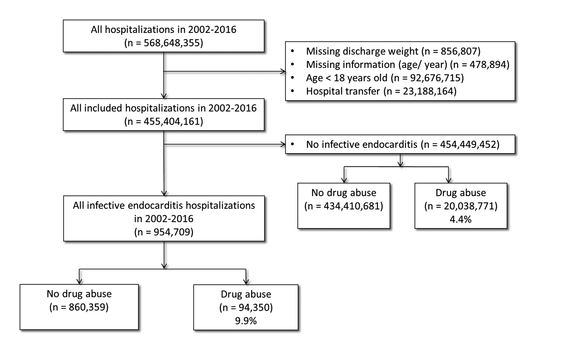Infective endocarditis occurs when bacteria or fungi in the blood stream enter the heart's inner lining or valves. Nearly 34,000 people receive treatment for this condition each year, of which approximately 20% die. One of the major risk factors for infective endocarditis is drug abuse.
Researchers analyzed data in the National Inpatient Sample registry from 2002-2016 on nearly one million hospitalized patients diagnosed with infective endocarditis to compare patients with heart infections related to drug abuse to those with heart infections from other causes. The registry is the largest publicly available database of U.S. hospitalizations.

Credit: 10.1161/JAHA.119.012969
During the 14 years studied, researchers found that the prevalence ratio for drug-abuse-related heart infections nearly doubled in the United States, from 8% to 16%. All geographic regions saw increases, and the highest jump occurred in the Midwest at nearly 5% per year.
They also found those with infective endocarditis related to drug abuse:
Were predominantly young, white men (median age 38 years old);
Were poorer, with nearly 42% having a median household income in the lowest national quartile, and about 45% are covered by Medicaid;
Had higher rates of HIV, hepatitis C and alcohol abuse compared to patients with infective endocarditis who are not drug abusers;
Had longer hospital stays and higher health care costs; and
Were more likely to undergo heart surgery, yet less likely to die while hospitalized. Lower death rates are likely due to their significantly younger age.
Diseases that occurred more frequently among patients with heart infections from causes other than drug abuse included high blood pressure, diabetes, heart failure, kidney disease and lung disease. A study limitation is that the registry relies solely on diagnostic codes (ICD codes) and does not include hospital transfers. Another limitation is that the registry provided only general information by region, without details specific to states, cities and rural towns.





Comments